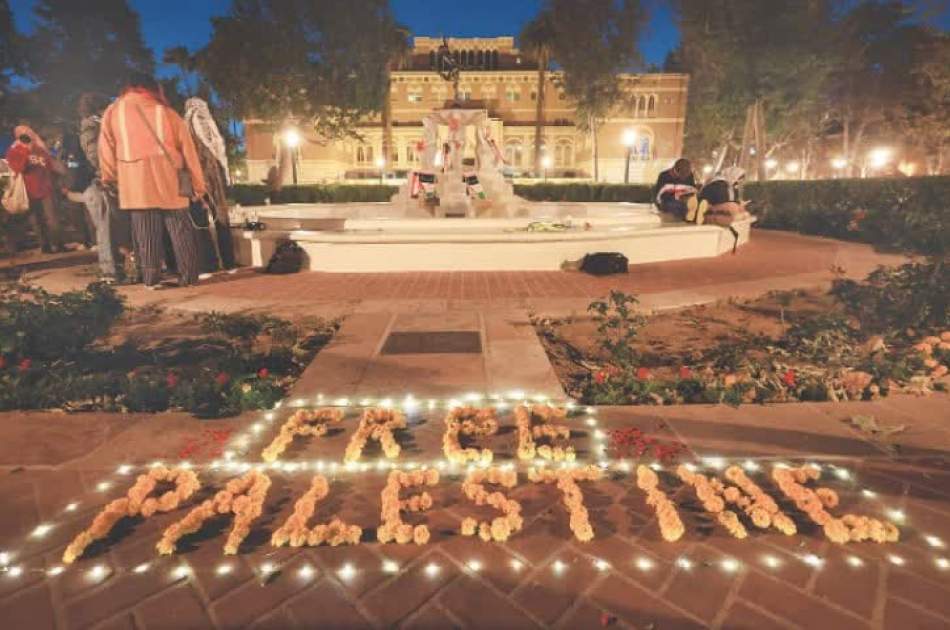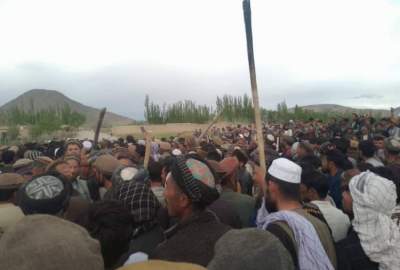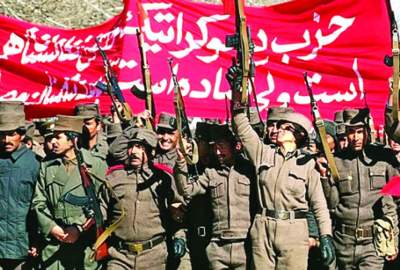At 7am on Thursday, minutes after a fifth-year PhD student at Princeton University’s economics department stepped on campus, he was arrested and detained in a holding cell.
Publish dateMonday 29 April 2024 - 11:23
Story Code : 289563
Afghan Voice Agency (AVA)-Monitoring: His crime? Being at the site of a protest camp, set up by students demanding the university divest from organizations and companies facilitating or profiting from Israel’s ongoing atrocities against Palestinians in Gaza.
The student, a US national of Pakistani origin, told Dawn that he was held by the university police, detained in a holding cell and charged with trespassing.
“[It] felt quite surreal,” he said about the charge, given that he was a university student and had the right to be present on campus at the time.
“Out of 100 people at the protest, only two of us were arrested, both of us of South Asian ethnicity.”
He said the protesters want the varsity to divest from entities such as G4S (a UK-based security company) and the Department of Defense.
Most colleges and universities in the US have endowment funds to support the expenses incurred in teaching, research, student aid, and other services. They mostly comprise money donated to the university.
According to the American Council on Education, a US-based nonprofit association for higher education, these funds are usually invested for long-term returns.
Princeton’s endowment fund was $34.1 billion for the fiscal year that ended June 30, 2023.
According to the student, there was “no financial transparency at all” regarding the university’s investments from its endowment.
He said the protesters making these demands come from diverse backgrounds — White, Jews, Arabs, African Americans, Asians, Hispanics and Muslims.
The stated goal of the protest was simple: to force the university to “disclose, divest and disassociate with organizations enabling the assault on Palestinian lives”.
Nationwide protests
Over the past few weeks, similar protests have been held in universities around the US, resulting in heated discussion over the right to free speech and the political discourse on university campuses.
In some universities, the administration called in police and security forces to dislodge protesting students. AFP reported that over the weekend, around 275 people were arrested on four campuses, at times by police in riot gear using chemical irritants and tasers.
The wave of demonstrations started with students setting up their camp at Columbia University in New York last week.
A female student of South Asian origin, who was enrolled in a master’s Programme, told Dawn that the encampment, which began on Wednesday and has been ongoing since then, was initiated by the Columbia University Apartheid Divest coalition.
On Thursday afternoon, the university’s president, Nemat Minouche Shafik, called the New York Police Department to disperse the protesters.
On Thursday afternoon, the university’s president, Nemat Minouche Shafik, called the New York Police Department to disperse the protesters.
In the action that followed, 108 students were arrested, according to the student who talked to Dawn on the condition of anonymity.
She said this was the first time that police was called on students since 1968, when anti-war protests broke out amidst the war in Vietnam.
This acted as a catalyst for the protests to spread across US universities. Students turned up at Columbia to protests in droves the very next day.
A similar police action was also witnessed at the University of Michigan’s campus in Ann Arbor.
One of the students explained to Dawn that the use of undue and illegitimate force against protesters was jaw-dropping.
She claimed that one of the female protesters was “body slammed” while another had her “hijab ripped off”.
Intimidation tactics
Students who spoke to Dawn believed that university administrations’ were threatening protesters with punitive actions for peaceful assembly.
The student from Princeton believed that peaceful protests on campus “should not be punished via legal recourse”.
The universities “are failing miserably in upholding ideals of the right to express one’s opinions” and have “forcefully and arbitrarily” banned students from campus whilst threatening them with academic consequences.
The student from the University of Michigan claimed the administration was introducing “restrictive policies to repress students”.
The university recently introduced ‘Disruptive Activity Policy’ which “infringed upon the rights bestowed to them under the First Amendment” which guarantees freedoms of religion, expression, assembly, and the right to petition.
The student from Columbia claimed that the administration “refused to negotiate in good faith” and continued to use “fear mongering tactics to scare students”.
The pro-Palestine protests are often met with counter-demonstrations, which the students believed weren’t dealt with the same ferocity.
University of Michigan students claimed that their camps were targeted by counter-protestors who “harass and intimidate” the students. She added that the protesting students have a mechanism to deal with this retaliation and have devised “comprehensive safety protocols” to prevent any altercations and ensure the movement’s growth./Dawn
avapress.com/vdcceoqi12bq4p8.-ya2.html
Tags
Top hits







